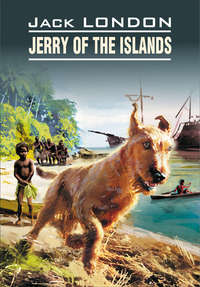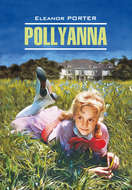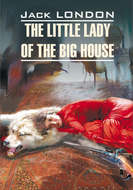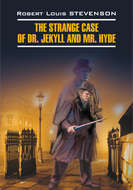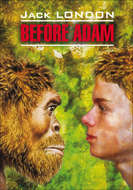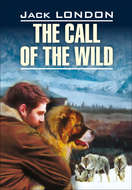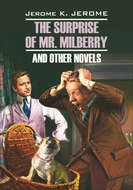Kitabı oku: «Jerry of the Islands / Джерри-островитянин. Книга для чтения на английском языке», sayfa 3
“Hey! You fella boy! I make ’m big fella talk. This fella dog he belong along me. One fella boy hurt ’m that fella dog – my word! – me cross too much along that fella boy. I knock ’m seven bells outa that fella boy.55 You take ’m care leg belong you. I take ’m care dog belong me. Savve?”
And the passengers, still perched in the air, with gleaming black eyes and with querulerus chirpings one to another, accepted the white man’s law. Even Lerumie, variously lacerated by the barbed wire, did not scowl nor mutter threats. Instead, and bringing a roar of laughter from his fellows and a twinkle into the skipper’s eyes, he rubbed questing fingers over his scratches and murmured: “My word! Some big fella dog that fella!”
It was not that Jerry was unkindly. Like Biddy and Terrence, he was fierce and unafraid; which attributes were wrapped up in his heredity. And, like Biddy and Terrence, he delighted in nigger-chasing, which, in turn, was a matter of training. From his earliest puppyhood he had been so trained. Niggers were niggers, but white men were gods, and it was the white-gods who had trained him to chase niggers and keep them in their proper lesser place in the world. All the world was held in the hollow of the white man’s hands. The niggers – well, had not he seen them always compelled to remain in their lesser place? Had he not seen them, on occasion, triced up to the palm-trees of the Meringe compound and their backs lashed to ribbons by the white-gods? Small wonder56 that a high-born Irish terrier, in the arms of love of the white-god, should look at niggers through white-god’s eyes, and act toward niggers in the way that earned the white-god’s reward of praise.
It was a busy day for Jerry. Everything about the Arangi was new and strange, and so crowded was she that exciting things were continually happening. He had another encounter with the wild-dog, who treacherously attacked him in flank from ambuscade57. Trade boxes belonging to the blacks had been irregularly piled so that a small space was left between two boxes in the lower tier. From this hole, as Jerry trotted past in response to a call from the skipper, the wild-dog sprang, scratched his sharp puppy-teeth into Jerry’s yellow-velvet hide, and scuttled back into his lair.
Again Jerry’s feelings were outraged. He could understand flank attack. Often he and Michael had played at that, although it had only been playing. But to retreat without fighting from a fight once started was alien to Jerry’s ways and nature. With righteous wrath58 he charged into the hole after his enemy. But this was where the wild-dog fought to best advantage – in a corner. When Jerry sprang up in the confined space he bumped his head on the box above, and the next moment felt the snarling impact of the other’s teeth against his own teeth and jaw.
There was no getting at the wild-dog59, no chance to rush against him wholeheartedly, with generous full weight in the attack. All Jerry could do was to crawl and squirm and belly forward, and always he was met by a snarling mouthful of teeth. Even so, he would have got the wild-dog in the end, had not Borckman, in passing, reached in and dragged Jerry out by a hind-leg. Again came Captain Van Horn’s call, and Jerry, obedient, trotted on aft.
A meal was being served on deck in the shade of the spanker, and Jerry, sitting between the two men received his share60. Already he had made the generalization that of the two, the captain was the superior god, giving many orders that the mate obeyed. The mate, on the other hand, gave orders to the blacks, but never did he give orders to the captain. Furthermore, Jerry was developing a liking for the captain, so he snuggled close to him. When he put his nose into the captain’s plate, he was gently reprimanded. But once, when he merely sniffed at the mate’s steaming tea-cup, he received a snub on the nose from the mate’s grimy forefinger. Also, the mate did not offer him food.
Captain Van Horn gave him, first of all, a pannikin of oatmeal mush, generously flooded with condensed cream and sweetened with a heaping spoonful of sugar. After that, on occasion, he gave him morsels of buttered bread and slivers of fried fish from which he first carefully picked the tiny bones.
His beloved Mister Haggin had never fed him from the table at meal time, and Jerry was beside himself with the joy61 of this delightful experience. And, being young, he allowed his eagerness to take possession of him, so that soon he was unduly urging the captain for more pieces of fish and of bread and butter. Once, he even barked his demand. This put the idea into the captain’s head, who began immediately to teach him to “speak.”
At the end of five minutes he had learned to speak softly, and to speak only once – a low, mellow, bell-like bark of a single syllable. Also, in this first five minutes, he had learned to “sit down,” as distinctly different from “lie down”; and that he must sit down whenever he spoke, and that he must speak without jumping or moving from the sitting position, and then must wait until the piece of food was passed to him.
Further, he had added three words to his vocabulary. For ever after, “speak” would mean to him “speak,” and “sit down” would mean “sit down” and would not mean “lie down.” The third addition to his vocabulary was “Skipper.” That was the name he had heard the mate repeatedly call Captain Van Horn. And just as Jerry knew that when a human called “Michael,” that the call referred to Michael and not to Biddy, or Terrence, or himself, so he knew that Skipper was the name of the two-legged white master of this new floating world.
“That isn’t just a dog,” was Van Horn’s conclusion to the mate. “There’s a sure enough human brain there behind those brown eyes. He’s six months old. Any boy of six years would be an infant phenomenon to learn in five minutes all that he’s just learned. Why, Gott fer dang62, a dog’s brain has to be like a man’s. If he does things like a man, he’s got to think like a man.”
Chapter IV
The companionway into the main cabin was a steep ladder, and down this, after his meal, Jerry was carried by the captain. The cabin was a long room, extending for the full width of the Arangi from a lazarette aft to a tiny room for’ard. For’ard of this room, separated by a tight bulkhead, was the forecastle where lived the boat’s crew. The tiny room was shared between Van Horn and Borckman, while the main cabin was occupied by the three-score and odd return boys63. They squatted about and lay everywhere on the floor and on the long low bunks that ran the full length of the cabin along either side.
In the little stateroom the captain tossed a blanket on the floor in a corner, and he did not find it difficult to get Jerry to understand that that was his bed. Nor did Jerry, with a full stomach and weary from so much excitement, find it difficult to fall immediately asleep.
An hour later he was awakened by the entrance of Borckman. When he wagged his stub of a tail and smiled friendly with his eyes, the mate scowled at him and muttered angrily in his throat. Jerry made no further overtures, but lay quietly watching. The mate had come to take a drink. In truth, he was stealing the drink from Van Horn’s supply. Jerry did not know this. Often, on the plantation, he had seen the white men take drinks. But there was something somehow different in the manner of Borckman’s taking a drink. Jerry was aware, vaguely, that there was something surreptitious about it. What was wrong he did not know, yet he sensed the wrongness and watched suspiciously.
After the mate departed, Jerry would have slept again had not the carelessly latched door swung open with a bang. Opening his eyes, prepared for any hostile invasion from the unknown, he fell to watching a large cockroach crawling down the wall. When he got to his feet and warily stalked toward it, the cockroach scuttled away with a slight rustling noise and disappeared into a crack. Jerry had been acquainted with cockroaches all his life, but he was destined to learn new things about them from the particular breed that dwelt on the Arangi.
After a cursory examination of the stateroom he wandered out into the cabin. The blacks, sprawled about everywhere, but, conceiving it to be his duty to his Skipper, Jerry made it a point to identify each one64. They scowled and uttered low threatening noises when he sniffed close to them. One dared to menace him with a blow, but Jerry, instead of slinking away, showed his teeth and prepared to spring. The black hastily dropped the offending hand to his side and made soothing, penitent noises, while others chuckled; and Jerry passed on his way. It was nothing new. Always a blow was to be expected from blacks when white men were not around. Both the mate and the captain were on deck, and Jerry, though unafraid, continued his investigations cautiously.
But at the doorless entrance to the lazarette aft, he threw caution to the winds and darted in in pursuit of the new scent that came to his nostrils. A strange person was in the low, dark space whom he had never smelled. Clad in a single shift and lying on a coarse grass-mat spread upon a pile of tobacco cases and fifty-pound tins of flour, was a young black girl.
There was something furtive and lurking about her that Jerry did not fail to sense, and he had long since learned that something was wrong when any black lurked or skulked. She cried out with fear as he barked an alarm and pounced upon her. Even though his teeth scratched her bare arm, she did not strike at him. Not did she cry out again. She cowered down and trembled and did not fight back65. Keeping his teeth locked in the hold he had got on her flimsy shift, he shook and dragged at her, all the while growling and scolding for her benefit and yelping a high clamour to bring Skipper or the mate.
In the course of the struggle the girl over-balanced on the boxes and tins and the entire heap collapsed. This caused Jerry to yelp a more frenzied alarm, while the blacks, peering in from the cabin, laughed with cruel enjoyment.
When Skipper arrived, Jerry wagged his stump tail and, with ears laid back, dragged and tugged harder than ever at the thin cotton of the girl’s garment. He expected praise for what he had done, but when Skipper merely told him to let go, he obeyed with the realization that this lurking, fear-struck creature was somehow different, and must be treated differently, from other lurking creatures.
Fear-struck she was, as it is given to few humans to be and still live. Van Horn called her his parcel of trouble66, and he was anxious to be rid of the parcel, without, however, the utter annihilation of the parcel. It was this annihilation which he had saved her from when he bought her in even exchange for a fat pig.
Stupid, worthless, spiritless, sick, not more than a dozen years old, no delight in the eyes of the young men of her village, she had been consigned by her disappointed parents to the cooking-pot. When Captain Van Horn first encountered her had been when she was the central figure in a lugubrious procession on the banks of the Balebuli River.
Anything but a beauty – had been his appraisal when he halted the procession for a pow-wow. Lean from sickness, her skin mangy with the dry scales of the disease called bukua, she was tied hand and foot and, like a pig, slung from a stout pole that rested on the shoulders of the bearers, who intended to dine off of her67. Too hopeless to expect mercy, she made no appeal for help, though the horrible fear that possessed her was eloquent in her wild-staring eyes.
In the universal bêche-de-mer English, Captain Van Horn had learned that she was not regarded with relish by her companions, and that they were on their way to stake her out up to her neck in the running water of the Balebuli. But first, before they staked her, their plan was to dislocate her joints and break the big bones of the arms and legs. This was no religious rite, no placation of the brutish jungle gods. Merely was it a matter of gastronomy. Living meat, so treated, was made tender and tasty, and, as her companions pointed out, she certainly needed to be put through such a process. Two days in the water, they told the captain, ought to do the business. Then they would kill her, build the fire, and invite in a few friends.
After half an hour of bargaining, during which Captain Van Horn had insisted on the worthlessness of the parcel, he had bought a fat pig worth five dollars and exchanged it for her. Thus, since he had paid for the pig in trade goods, and since trade goods were rated at a hundred per cent. profit, the girl had actually cost him two dollars and fifty cents.
And then Captain Van Horn’s troubles had begun. He could not get rid of the girl. Too well he knew the natives of Malaita to turn her over to them anywhere on the island. Chief Ishikola of Su’u had offered five twenties of drinking coconuts for her, and Bau, a bush chief, had offered two chickens on the beach at Malu. But this last offer had been accompanied by a sneer, and had tokened the old rascal’s scorn of the girl’s scrawniness. Failing to connect with the missionary brig, the Western Cross, on which she would not have been eaten, Captain Van Horn had been compelled to keep her in the cramped quarters of the Arangi against a problematical future time when he would be able to turn her over to the missionaries68.
But toward him the girl had no heart of gratitude because she had no brain of understanding. She, who had been sold for a fat pig, considered her pitiful rôle in the world to be unchanged. Eatee she had been. Eatee she remained. Her destination merely had been changed, and this big fella white marster of the Arangi would undoubtedly be her destination when she had sufficiently fattened. His designs on her had been transparent from the first69, when he had tried to feed her up. And she had outwitted him by resolutely eating no more than would barely keep her alive.
As a result, she, who had lived in the bush all her days and never so much as set foot in a canoe, rocked and rolled unendingly over the broad ocean in a perpetual nightmare of fear. In the bêche-de-mer that was current among the blacks of a thousand islands and ten thousand dialects, the Arangi’s procession of passengers assured her of her fate. “My word, you fella Mary,” one would say to her, “short time little bit that big fella white marster kai-kai along you.” Or, another: “Big fella white marster kai-kai along you, my word, belly belong him walk about too much.”
Kai-kai was the bêche-de-mer for “eat.” Even Jerry knew that. “Eat” did not obtain in his vocabulary; but kai-kai did, and it meant all and more than “eat,” for it served for both noun and verb.
But the girl never replied to the jeering of the blacks. For that matter, she never spoke at all, not even to Captain Van Horn, who did not so much as know her name.
It was late afternoon, after discovering the girl in the lazarette, when Jerry again came on deck. Scarcely had Skipper, who had carried him up the steep ladder, dropped him on deck than Jerry made a new discovery – land. He did not see it, but he smelled it. His nose went up in the air and quested to windward along the wind that brought the message70, and he read the air with his nose as a man might read a newspaper – the salt smells of the seashore and of the dank muck of mangrove swamps at low tide, the spicy fragrances of tropic vegetation, and the faint, most faint, acrid tingle of smoke from smudgy fires.
The trade, which had laid the Arangi well up under the lee of this outjutting point of Malaita, was now failing, so that she began to roll in the easy swells with crashings of sheets and tackles and thunderous flappings of her sails. Jerry no more than cocked a contemptuous quizzical eye at the mainsail anticking above him. He knew already the empty windiness of its threats, but he was careful of the mainsheet blocks, and walked around the traveller instead of over it.
While Captain Van Horn, taking advantage of the calm to exercise the boat’s crew with the fire-arms and to limber up the weapons, was passing out the Lee-Enfields from their place on top the cabin skylight, Jerry suddenly crouched and began to stalk stiff-legged. But the wild-dog, three feet from his lair under the trade-boxes, was not unobservant. He watched and snarled threateningly. It was not a nice snarl. In fact, it was as nasty and savage a snarl as all his life had been nasty and savage. Most small creatures were afraid of that snarl, but it had no deterrent effect on Jerry, who continued his steady stalking. When the wild-dog sprang for the hole under the boxes, Jerry sprang after, missing his enemy by inches. Tossing overboard bits of wood, bottles and empty tins, Captain Van Horn ordered the eight eager boat’s crew with rifles to turn loose71. Jerry was excited and delighted with the fusillade, and added his puppy yelpings to the noise. As the empty brass cartridges were ejected, the return boys scrambled on the deck for them, esteeming them as very precious objects and thrusting them, still warm, into the empty holes in their ears. Their ears were perforated with many of these holes, the smallest capable of receiving a cartridge, while the larger ones contained clay pipes, sticks of tobacco, and even boxes of matches. Some of the holes in the ear-lobes were so huge that they were plugged with carved wooden cylinders three inches in diameter.
Mate and captain carried automatics in their belts, and with these they turned loose, shooting away clip after clip to the breathless admiration of the blacks for such marvellous rapidity of fire. The boat’s crew were not even fair shots, but Van Horn, like every captain in the Solomons, knew that the bush natives and salt-water men were so much worse shots, and knew that the shooting of his boat’s crew could be depended upon – if the boat’s crew itself did not turn against the ship in a pinch.
At first, Borckman’s automatic jammed, and he received a caution from Van Horn for his carelessness in not keeping it clean and thin-oiled. Also, Borckman was twittingly asked how many drinks he had taken, and if that was what accounted for his shooting being under his average. Borckman explained that he had a touch of fever, and Van Horn deferred stating his doubts until a few minutes later, squatting in the shade of the spanker with Jerry in his arms, he told Jerry all about it.
“The trouble with him is the schnapps, Jerry,” he explained. “Gott fer dang, it makes me keep all my watches and half of his72. And he says it’s the fever. Never believe it, Jerry. It’s the schnapps – just the plain s-c-h-n-a-p-p-s schnapps. An’ he’s a good sailor-man, Jerry, when he’s sober. But when he’s schnappy he’s sheer lunatic. Then his noddle goes pinwheeling73 and he’s a blighted fool, and he’d snore in a gale and suffer for sleep in a dead calm74. – Jerry, you’re just beginning to pad those four little soft feet of yours into the world, so take the advice of one who knows and leave the schnapps alone. Believe me, Jerry, boy – listen to your father – schnapps will never buy you anything75.”
Whereupon, leaving Jerry on deck to stalk the wild-dog, Captain Van Horn went below into the tiny stateroom and took a long drink from the very bottle from which Borckman was stealing.
The stalking of the wild-dog became a game, at least to Jerry, who was so made that his heart bore no malice76, and who hugely enjoyed it. Also, it gave him a delightful consciousness of his own mastery, for the wild-dog always fled from him. At least so far as dogs were concerned, Jerry was cock of the deck77 of the Arangi. It did not enter his head to query how his conduct affected the wild-dog, though, in truth, he led that individual a wretched existence. Never, except when Jerry was below, did the wild one dare venture more than several feet from his retreat, and he went about in fear and trembling of the fat roly-poly puppy who was unafraid of his snarl.
In the late afternoon, Jerry trotted aft, after having administered another lesson to the wild-dog, and found Skipper seated on the deck, back against the low rail, knees drawn up, and gazing absently off to leeward. Jerry sniffed his bare calf – not that he needed to identify it, but just because he liked to, and in a sort of friendly greeting. But Van Horn took no notice, continuing to stare out across the sea. Nor was he aware of the puppy’s presence.
Jerry rested the length of his chin on Skipper’s knee and gazed long and earnestly into Skipper’s face. This time Skipper knew, and was pleasantly thrilled; but still he gave no sign. Jerry tried a new tack. Skipper’s hand drooped idly, half open, from where the forearm rested on the other knee. Into the part-open hand Jerry thrust his soft golden muzzle to the eyes and remained quite still. Had he been situated to see, he would have seen a twinkle in Skipper’s eyes, which had been withdrawn from the sea and were looking down upon him. But Jerry could not see. He kept quiet a little longer, and then gave a prodigious sniff.
This was too much for Skipper, who laughed with such genial heartiness as to lay Jerry’s silky ears back and down in self-deprecation of affection and pleadingness to bask in the sunshine of the god’s smile. Also, Skipper’s laughter set Jerry’s tail wildly bobbing. The half-open hand closed in a firm grip that gathered in the slack of the skin of one side of Jerry’s head and jowl. Then the hand began to shake him back and forth with such good will that he was compelled to balance back and forth on all his four feet.
It was bliss to Jerry. Nay, more, it was ecstasy. For Jerry knew there was neither anger nor danger in the roughness of the shake, and that it was play of the sort that he and Michael had indulged in. On occasion, he had so played with Biddy and lovingly mauled her about. And, on very rare occasion, Mister Haggin had lovingly mauled him about. It was speech to Jerry, full of unmistakable meaning.
As the shake grew rougher, Jerry emitted his most ferocious growl, which grew more ferocious with the increasing violence of the shaking. But that, too, was play, a making believe to hurt the one he liked too well to hurt78. He strained and tugged at the grip, trying to twist his jowl in the slack of skin so as to reach a bite.
When Skipper, with a quick thrust, released him and shoved him clear, he came back, all teeth and growl, to be again caught and shaken. The play continued, with rising excitement to Jerry. Once, too quick for Skipper, he caught his hand between teeth; but he did not bring them together. They pressed lovingly, denting the skin, but there was no bite in them.
The play grew rougher, and Jerry lost himself in the play. Still playing, he grew so excited that all that had been feigned became actual. This was battle, a struggle against the hand that seized and shook him and thrust him away. The make-believe of ferocity passed out of his growls; the ferocity in them became real. Also, in the moments when he was shoved away and was springing back to the attack, he yelped in high-pitched puppy hysteria. And Captain Van Horn, realizing, suddenly, instead of clutching, extended his hand wide open in the peace sign that is as ancient as the human hand79. At the same time his voice rang out the single word, “Jerry!” In it was all the imperativeness of reproof and command and all the solicitous insistence of love.
Jerry knew and was checked back to himself. He was instantly contrite, all soft humility, ears laid back with pleadingness for forgiveness and protestation of a warm throbbing heart of love. Instantly, from an open-mouthed, fang-bristling dog in full career of attack, he melted into a bundle of softness and silkiness, that trotted to the open hand and kissed it with a tongue that flashed out between white gleaming teeth like a rose-red jewel. And the next moment he was in Skipper’s arms, jowl against cheek, and the tongue was again flashing out in all the articulateness possible for a creature denied speech. It was a veritable love-feast, as dear to one as to the other.
“Gott fer dang!” Captain Van Horn crooned. “You’re nothing but a bunch of high-strung sensitiveness, with a golden heart in the middle and a golden coat wrapped all around. Gott fer dang, Jerry, you’re gold, pure gold, inside and out, and no dog was ever minted like you in all the world. You’re heart of gold, you golden dog, and be good to me and love me as I shall always be good to you and love you for ever and for ever.”
And Captain Van Horn, who ruled the Arangi in bare legs, a loin-cloth, and a sixpenny under-shirt, and ran cannibal blacks back and forth in the blackbird trade with an automatic strapped to his body waking and sleeping and with his head forfeit in scores of salt-water villages and bush strongholds, and who was esteemed the toughest skipper in the Solomons where only men who are tough may continue to live and esteem toughness, blinked with sudden moisture in his eyes, and could not see for the moment the puppy that quivered all its body of love in his arms and kissed away the salty softness of his eyes.
Ücretsiz ön izlemeyi tamamladınız.
